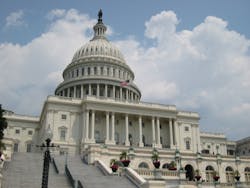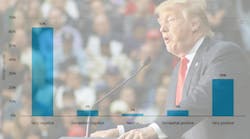Water Leaders Urge Passage of Infrastructure Legislation
With pivotal water infrastructure legislation in the balance, more than 130 water utility leaders from 46 states traveled to Capitol Hill to advocate for the creation of a Water Infrastructure Finance and Innovation Authority (WIFIA) during the American Water Works Assn.'s (AWWA) Water Matters! Fly In.
The fly in event comes as AWWA releases its 2014 State of the Water Industry Report, which shows that water and wastewater infrastructure is the top concern of water professionals throughout North America. A 2012 in-depth study from AWWA showed the costs of repairing and expanding drinking water infrastructure alone will top $1 trillion over the next 25 years.
“Our nation’s water systems protect public health and the environment, make fire protection possible, and are vital to any community’s long-term economic growth and stability,” said AWWA President Jim Chaffee. “By holding down the cost of financing large water projects, WIFIA will result in lower water bills for consumers.”
The WIFIA proposal, modeled after a successful program in the transportation sector, would make low-interest federal loans available for large water, wastewater and storm water projects. It was passed by the U.S. Senate in May as part of the Water Resources Development Act (S.601). The House passed H.R. 3080, the Water Resources Reform and Development Act, this fall, but without a WIFIA title. Now a House-Senate conference is meeting to iron out a single water resources bill.
“The time for WIFIA is now,” said Aurel Arndt, chair of AWWA’s Water Utility Council and chief executive officer of Lehigh, Penn., County Authority. “If a community can save just two percentage points on the interest rate for a 30-year loan, that results in cost savings of 25% for the total project. That’s big savings for local communities without significantly impacting the federal budget.”
In addition to supporting WIFIA, the water utility leaders called for additional measures to support water infrastructure needs. They asked for robust funding for existing drinking water and wastewater state revolving loan fund programs, protecting the tax-exempt status of municipal bonds, and removing water infrastructure projects from state volume caps on private activity bonds.
The U.S. Department of Commerce Bureau of Economic Analysis (BEA) estimates that for every dollar spent on water infrastructure, about $2.62 is generated in the private economy. And for every job added in the water workforce, the BEA estimates 3.68 jobs are added to the national economy.
With the January West Virginia chemical spill that disrupted water service to 300,000 people on the minds of many legislators, the water utility leaders also asked Congress to ensure a thorough review of existing laws and regulations concerning above ground storage tanks to determine if changes are needed to federal law. They also supported legislation such as H.R. 3696, the National Cybersecurity and Critical Infrastructure Protection Act, which would provide greater information sharing between federal agencies and critical sectors such as the water sector.
Source: American Water Works Assn.


